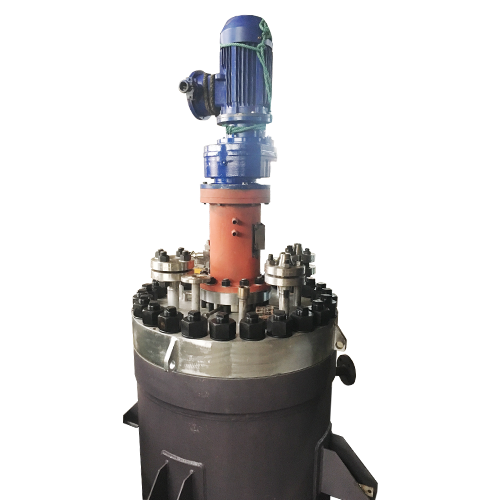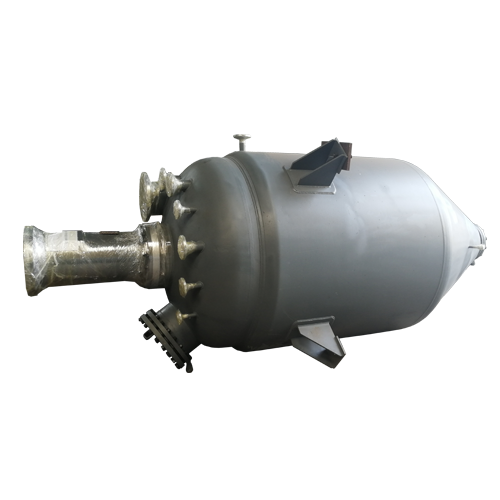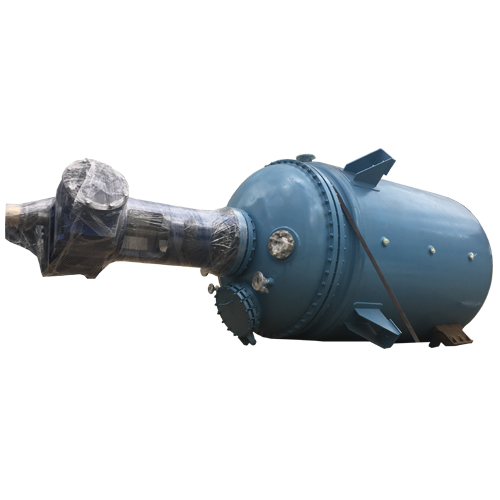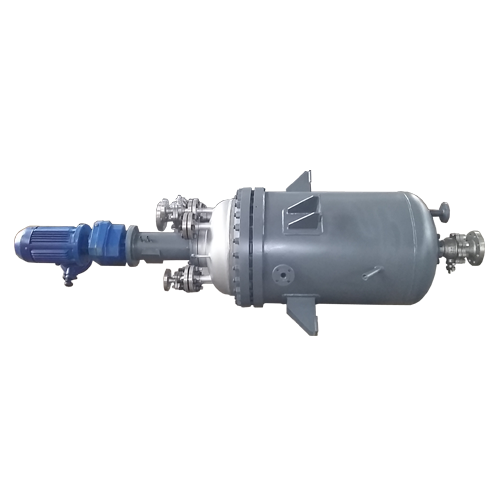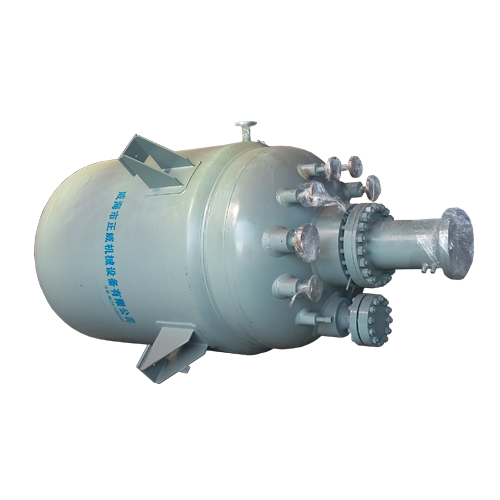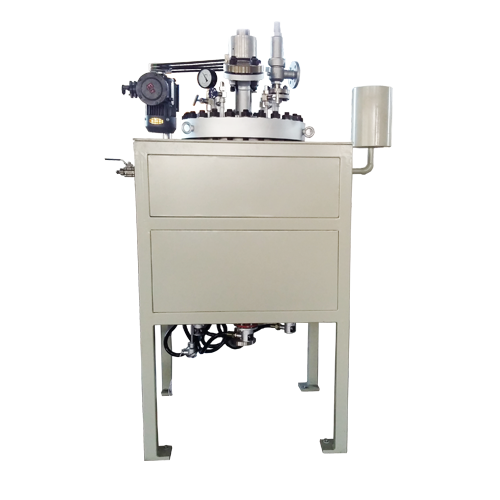Product Center
Your Current Location:Home > Product CenterThe open-type flat-lid structure reactor has two types: flat end flange type and flat cover reverse flange type. The design concepts of these two structures are basically the same, but the flat cover reverse flange type is more expensive than flat cover. The flange type of the cover end is cheaper. The design concept is based on certain chemical products that require higher pressure (4.0-35Mpa) during the production process, without too much restriction on temperature, and small volume (below 3000L). Because the open structure is more convenient for equipment maintenance and disassembly, especially for highly toxic and flammable chemical products, this structure can improve the working environment of workers and reduce their labor intensity. Because this structure is suitable for higher pressure and the barrel is thicker, the processing cycle is longer.
The crystallization reactor is used in the production process of forced cooling and crystallization in the production process of chemical products.
In the chemical industry, for example, in the production process of tetrabutylammonium bromide, the reactants need to be forced to cool and crystallize in the crystallization reactor. The crystallization reactor has a cylindrical barrel and a conical bottom, a cylindrical barrel and a cone. The bottom of the shaped cylinder has a double cylinder wall, and the cooling liquid inlet and outlet cavity is formed in the middle of the double cylinder wall, and the medium in the crystallization reaction kettle is forcedly cooled by the cooling liquid to make it crystallize. Some processes use inner coils and nitrogen to cool the contents of the kettle.
The powerful agitator is equipped with a wall scraping structure, which can effectively drive the materials adhered to the wall of the kettle to make the reaction more fully and evenly.
Generally, at low temperatures, conventional rock wool insulation is used outside the jacket. For lower temperatures, a vacuum insulation jacket is added outside the refrigeration jacket to isolate the air heat transfer and continuously maintain the low temperature in the kettle.
The stirred tank is suitable for high-temperature and high-pressure synthesis reaction, gas-liquid reaction, exothermic reaction, composition test, stability and corrosion test, etc. The main customer groups are fine chemicals, supercritical reactions, catalyst evaluation, chemistry, pharmaceuticals, polymer synthesis, metallurgy and petrochemicals.
According to the different sealing types of the stirring paddle and the kettle cover, it can be divided into: packing seal, mechanical seal and magnetic seal. Heating methods include electric heating, thermal oil electric heating, far-infrared heating, etc. The cooling method is jacket or coil refrigerant circulating cooling in the kettle.
The material of the kettle body can be made of austenitic stainless steel (S30408, S31603, S32168, S31008), duplex stainless steel (S22053, S22253), titanium (TA2), nickel (Ni6) and composite steel plates according to different media requirements. The kettle body structure has Flat cover high pressure reactor, convex cover high pressure reactor and closed reactor body with manhole, the opening on the cover can be designed according to user requirements.
The core part of magnetic stirring is a ring-shaped strong magnetic coupling stirring device. Multiple magnetic steel rings are made of two powerful permanent magnets inside and outside; the inner magnetic steel body is enclosed in a stainless steel sealed cylinder connected to the stirring part, sealing the cylinder and the kettle The cover, the kettle body, and the fastening connection form a static sealed cavity, so that the reaction medium is completely in a static sealed state, without any leakage, pollution or personal danger; the speed-regulating motor drives the outer magnetic steel body, and the strong magnetic force passes through the stainless steel without contact The resultant sealed cylinder attracts each other with the strong magnetic force of the inner magnetic steel body enclosed in the sealed cylinder, mutually positions itself and acts on the axial rotation traction to perform high temperature and high pressure stirring reaction.
The catalytic hydrogenation reactor is equipped with an explosion-proof motor and an explosion-proof control cabinet, and is well sealed, suitable for various chemical production reactions of catalytic hydrogenation.
Hydrogenation reaction refers to a reaction process in which hydrogen interacts with other compounds, usually in the presence of a catalyst. The hydrogenation reaction belongs to the category of reduction.
There are two types of commonly used hydrogenation reactors and reactors: one type is used for liquid phase hydrogenation process of high boiling point liquid or solid (solids need to be dissolved in solvent or heated and melted) raw materials, such as fat hydrogenation, heavy oil Hydrocracking, etc. Liquid phase hydrogenation is usually carried out under pressure, and the process can be batchwise or continuous. Intermittent liquid phase hydrogenation often uses an autoclave or bubbling reactor with a stirring device. The continuous liquid-phase hydrogenation can adopt a trickle bed reactor or a tubular reactor with three-phase continuous flow of gas, liquid and solid. Another type of reactor is used for continuous gas-phase hydrogenation processes, such as atmospheric gas-phase hydrogenation of benzene to cyclohexane, high-pressure gas-phase hydrogenation of carbon monoxide to synthesize methanol, etc. The reactor type can be tubular or tower. In the food field, it is mainly used to produce sorbitol, xylitol, maltitol and other continuous hydrogenation reactions, as well as intermittent hydrogenation reactions.
The stirring form of batch hydrogenation reactor is generally three-layer combined stirring, including paddle stirring, self-priming stirring and disc turbine dispersion stirring, which can also be selected according to user requirements. Our self-priming stirring paddle adds a set of riders, which can make the gas enter the hollow shaft of the stirring paddle more smoothly, and fully mix with the liquid gas.
Zhengwei hydrogenation reactor is equipped with CT4 explosion-proof motor and explosion-proof control box. All electrical components are explosion-proof configuration, so that customers can use it safely.
Heat transfer oil is a kind of heat carrier oil, a kind of special oil with good thermal stability for indirect heat transfer. Because of its uniform heating, accurate temperature control, high temperature under low vapor pressure, good heat transfer effect, energy saving, convenient transportation and operation, etc., it has been widely used in various occasions in recent years, and its use and dosage are more and more More and more. The Zhengwei reactor is equipped with an electric heating rod in the heating jacket and uses electric heating oil to achieve a stable temperature rise in the oil bath of the kettle body without the need for an additional external circulation device. For larger reactors, a hot oil pump is additionally equipped to circulate the heat transfer oil in the jacket to prevent coking.
The medium in the reaction kettle contains hydrogen, so it is equipped with explosion-proof motors and explosion-proof electrical components to improve the safety performance of the equipment.
